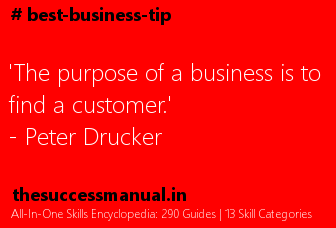The Basics Of Starting and Running Your Own Business

What is a Business?
Peter Drucker said, 'The purpose of a business is to find a customer.'
What being in business means
1. Making and selling something, product/service people want: Phones, Computers, Software, Cars, Personal services...
2. Selling/trading products/services that others have made: Shops, franchisees, trading houses (importers/exporters)...
#1 also does #2 as well.
Most people want advice on #1, thinking where the 'get big quickly' opportunities are. On the other hand, the world's economy runs through #2.
What kinds of businesses are there?
A. What kind of business can you start?
1. Buy a franchise: The safe route, most of the time, if you stick with the proven ones
2. Constantly-advertised 'work-at-home' businesses: Scams, mostly
3. Small business: Selling stuff (stores), manufacturing and selling stuff
4. Online business: Selling stuff online (Amazon, Ebay), manufacturing stuff and selling online
5. Software startup: Apps (web apps, mobile apps), SaaS (Software as a service), and so on
6. Service Business: This is where the most work is, something as basic as mowing lawns of the neighborhood and so on
7. Online Services: Aka Freelancing, contract jobs etc.
Or, you can buy an existing business.
B. Seven kinds of internet business models
Subscription-based: Charge a regular fee for using some tool or data
Content-based: Charge people to read or distribute your content
Lead generation: Large businesses for connecting them to consumers (great for fragmented industries)
Social networks: Target ads and products at a specific group of people
Brokers: Connect buyers and sellers together (Paypal, Ebay, CarsDirect, etc)
Advertising: Like brokers, except they charge advertising fees instead of per-transaction fees
E-commerce: Sell goods and services online
Innovation: Invent a product /service (software etc.) and then make and distribute it. There’s a lot of money to be made in small improvements (e.g. look at the evolution of cars or cell phones)
Process Invention: Change how people access products/services. Think Uber . Distribution is where you make money (whether you do it yourself or license your product for someone else to distribute). That is why writing a book is not a business; selling the book is.Â
Iteration: Take something that violates the commandment of scale (buying a franchise, buying and renting out real estate, etc). The downside is that iteration can be very slow.
(Source: 'Millionaire Fastlane' by DeMarco)
C. How to make money using the Internet
Connect advertisers to people who want to be advertised to.
Connect job hunters with jobs.
Connect information seekers with information.
Connect teams to each other.
Connect those seeking similar.
Connect to partners and those that can leverage your work.
Connect people who are proximate geographically.
Connect organizations spending money with ways to save money.
Connect like-minded people into a movement.
Connect people buying with people who are selling.
(Source: Seth Godin)
Whatever business you get into, understand the business first.
The small business model many do, but few write about
1. Not everyone has to start a business from ground up, learning through expensive 'trial and errors'.
You can still run a business based on models set by others.
2. Dreams: When we say startup or small business, we are seeing ourselves creating great products/services which people will love and buy pronto. If not, we are seeing ourselves sitting pretty in our shop/workshop/office watching customers come through the doors all the day long.
3. Reality: We don't see ourselves chasing after buyers for payments, seeing good people leave the company for better pay at bigger companies or having to continuously change machinery and operations to keep up with the top players, and dealing with 100s of other business problems. I am sure the problem with the taxes was mentioned somewhere.
4. Beware of the 'E' Myth: Michael E. Gerber writes in his popular book 'The E-Myth Revisited: Why Most Small Businesses Don't Work and What to Do About It' that the 'e'-myth stands for entrepreneur myth - the myth that your hard work and persistence will bring you success. Having a dream about a business does not guarantee success.
5. His solution is running a franchise-based business (preferably a franchise from a top brand), which helps the new, non-expert entrepreneur quickly run a finely tuned business process, with all work documented in operations manuals, checklists for everything, providing uniformly predictable service to the customer, pushing the service using proven scripted sales tactics. Ever notice the abnormally bright and glistening ads for fast food burgers and shakes, and the ever-present smile?
In other words, this is the fast food chain model.
In more other words, dreams are realized using details: Keep learning about improving business processes, make lost of lists of how to do all sorts of business processes, from marketing to hiring.
Other people have done this before you. Let's learn from them.
There are 30 more guides in starting and running businesses section.
❤ If you liked this, consider supporting us by checking out Tiny Skills - 250+ Top Work & Personal Skills Made Easy